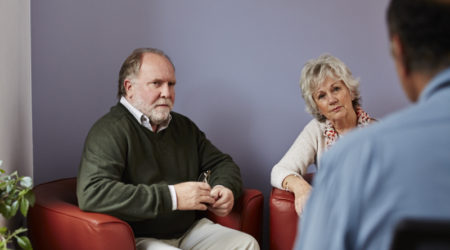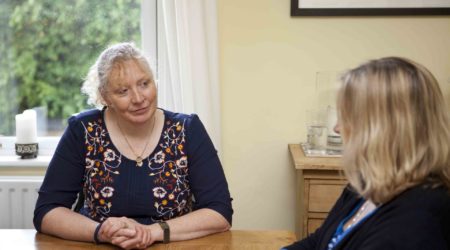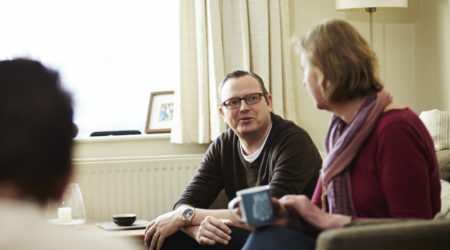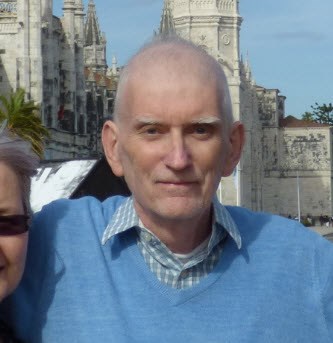

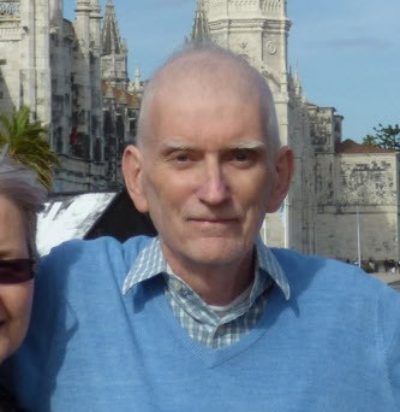

Peter
Peter was diagnosed with locally advanced pancreatic cancer in October 2018. He shares his story of diagnosis and his experience of chemotherapy
It all started in August 2018. We’d just returned from vacation on the Isle Of Wight. We’d eaten lunch one afternoon and after my wife went back to work I hopped with delight at the sink full of washing up. Never mind, it’s quickly done.
While drying the plates I felt a sudden dull pain in my right-hand side. I lived with it for a couple of days and as soon as it arrived the pain disappeared. I reached the conclusion that something I’d eaten previously had reacted adversely with me.
There was no further discomfort until one Friday afternoon in late October when the same dull ache returned. I told my wife who told me to call our local GP. For some reason, when I described the symptoms the GP called me in and told me to self-refer to the A&E department.
I got there about six in the evening and having passed through several calls of my name I ended up in the cheerful and comfortable surround of the surgical assessment unit. I ain’t no surgeon, but the location of the pain convinced me there was a strong hint of appendicitis.
The doctor who examined me asked me if it hurt, at which point he used both hands to press hard around my abdominal region. “Yup, it’s sore” I exclaimed. “How about here?” he asked and he selected one promising area which he probed. “Yeah! I can feel that very acutely” (soft expletives deleted). He told me to prepare for overnight admission. My wife went home to get some bits and pieces for me.
I slept fitfully that night. Not because of pain but because one patient on the ward kept making trumpet solos from a part of his body which I will not name but you can probably work out which. You can choose your friends, less so your family, but never who your fellow patients are.
The following morning once the ward had aired we had breakfast and a nice cuppa. I was examined again by a registrar and another junior doctor. I was told I wasn’t going anywhere that day and blood samples were taken. Some jaundice in my lower eyes was noted as were the, for some odd reason, rather pale yellow stools.
I was sent for an ultrasound where they told me I’m going to be in another day. Some chest X-rays were done followed by CT scans. The junior doctor came back to the ward and told me they were concerned about my pancreas and I’d see the consultant the next morning. That word, pancreas, made for a deeply unsettled night’s sleep. Even Mr. Windy, two beds down did little to distract me. More breakfast. Another delicious cuppa.
Being diagnosed
I heard general chit-chat outside the ward when the consultant swept in with a gaggle of students. They reviewed my blood tests, the ultrasound report and the radiologist’s reports on the X-rays and CT scans. He said he’d speak me to later.
Don’t get me wrong. Bad news isn’t always performed by a circus clown walking a tightrope with an elephant balanced on his head. If it had been an in-growing toenail he’d have told me what was on his mind. The gravity of what he wanted to tell me required my being called to a private room next to the ward reception. In the room was one of the ward’s wonderful nurses, some comfortable chairs, a box of tissues, an air of serenity and another cup of wonderful tea.
A moment of general chatter followed and then he told me what I suspected; it wasn’t appendicitis or any other itis. It was locally advanced vascular involvement pancreatic cancer of the uncinate process. He offered his sincere apology about the news and took his leave. The nurse consoled me and left me alone with my cuppa, which for some inexplicable reason didn’t really taste like anything.
Other nurses popped in and out and gave me reassuring hugs and shared my raw emotions. I left the ward feeling rather bruised and went outside to phone my wife to let her know what the doctor’s report had said. She rushed over to be with me and we sat in silence for a while. There was much I needed to say but sometimes your thoughts turn simple words into confused mutterings. Blokes don’t cry, do they? Maybe they do and this bloke did.
Having a stent put in
I was sent for a PET scan which was both clear and endorsed the CT scans which presented no metastatic evidence. The day after, a stent was fitted deep in my body’s plumbing to help the gall bladder to drain its liquid gold easier. So far, everything was starting to go well.
The stent procedure was weird. They spray the inside of your mouth with something that suppresses the natural gag reflex. I dimly recalled seeing a long tube being put down my throat and after a wonderfully sleepy interlude I was awakened and told everything had gone well and some scrapings were taken for pathology analysis. After all, if you’re going to have a stent put in they might as well take a sample from within while they’re there. Some would argue it’d be rude not to.
The chemo circus rolls into town
I later saw an oncologist where we discussed the treatment options. Unknown to me then a sequence of visits to a specialist centre were scheduled. The first day bloods would be taken and if they passed muster I’d go back the next day to start the FOLFIRNOX chemo infusion.
Cycle 1 of 6: Everything went well. In the two weeks leading up to cycle 2 I had no side effects of any kind. Clearly, the honeymoon was working well.
Cycle 2: Nothing to report. I was still on chemo honeymoon.
Cycle 3: Hair loss. Nothing significant but enough to go to the hairdresser and opt for an elected No. 3 shave. Also, I was beginning to feel very sensitive to cold weather.
Cycle 4: I felt I was now no longer clearing side effects fast enough before the next chemo session. The honeymoon was beginning to end. I didn’t experience any painful pins-and-needles in my feet that some people experience. Overall, I was going through chemo quite well but it really took a toll on my appetite and I had an unusual aftertaste in my mouth. It was almost as food tasted like it had been sautéed in Fairy Liquid. I was beginning to feel nauseous.
Cycle 5: The registrar waived me off for a week as my white cell count was below the level they require. Clearly, the little white cells were waving little white surrender flags pleading for mercy. The next week, the little white chaps were back in range. I left the ward later that evening and my first sensation getting outside in the chill wind was that I could taste ice crystals in my mouth and “feel” them in my nose. I’d been told that could happen. Weird. As I was in a nauseous phase I started carrying small plastic food bags with me…just in case.
Cycle 6 (last): The continual retching I was going through kept me housebound for almost a week. I really couldn’t risk going out. After all, how many patrons in a restaurant are going to thank you if you start retching into a plastic bag at the table? It won’t do their website reviews or recommendations any favours. The infusion in the ward really started walloping me from all directions.
Post chemo
It took several weeks to feel like I was rebounding from the chemo that was sloshing around my body. The nausea passed but the tiredness and fatigue made going to bed the best option in town. Over time my appetite returned and I yearned for lots of mashed potato, sausages and brown gravy. I ate that every day, sometimes twice.
My hair slowly started growing back. It’s still short and it needs another trim another time. I used to shave twice a week; now I was shaving every two or three weeks and not because I needed to. Chemo had definitely given me a so-called designer stubble.
I slowly started shaking off the main side effects. The nausea ended and the tiredness passed. I was still sensitive to cold weather but I tried to maintain some exercise as that’s essential regardless of chemo or not.
My weight was the biggest loser, literally. Prior to the doctor’s reports I’d been dieting and passed through quite quickly to my new target weight of 70kg. When I was first admitted in late October 2018 the dietitian weighed me and I was (unknowingly at the time) down to 66kg which got the alarm bells ringing. After the chemo cycles my weight has crashed through the 60s and has levelled off around 59kg.
Where to from here?
After my three month’s chemo was completed I weighed up the fact I wasn’t clearing my side effects fast enough anymore and I was becoming too saturated with the chemo. My wife and I decided that further infusion-based chemo is not for me. I diligently visited the local IV team each week to have my dressing changed and in April 2019 I decided it was time to have the PICC line removed. What a relief! To experience the removal of the PICC line left me feeling emotionally disconnected from the chemo process, which was a nice feeling.
One option the oncologist spoke to me about in November 2018 was possible radiotherapy. It seems they can do some pretty amazing things with radiology these days. Surgery wasn’t viable due to the vascular involvement which is quite typical. So far, no metastases have been identified and that’s a good sign.
I miss the friendly chats with other patients and I appreciated the wonderful help we all get from the various ward teams that run the day clinics. I don’t miss the horrible bi-weekly commute to hospital and taking out the second mortgage to pay for the parking. Nobody elects to have cancer but my hospital was recently named as the most expensive hospital in England for parking charges. That the hospital Trust seeks to profit from the misfortune of cancer patients is, in my opinion, downright wrong.
Nobody wants cancer. I’ve seen the rough side of it in other patients. I was at the hospital one afternoon and I bought a coffee from the cafe in the main reception area. Another patient sat nearby and asked one of the nurses walking by if there was anyone he could speak to about his employer. He explained that since his cancer diagnosis his number of working hours had been reduced due to his treatment and with it his salary had taken a big drop at a time when he has a mortgage and a younger family to look after. The nurse could do no more than refer him to the Citizen Advice for advice and with that she had to leave. It absolutely crushed me when I saw him sit there in silence and watched him cry.
It put my positive and upbeat mood in its right perspective. While my wife and I were making all sorts of plans of things to do, go to and enjoy during my early start of retirement his were far more acute with less to hope for or look forward to.
There is so much else I could write about and to be sure, each patient brings their own story along for the ride. I have received so much help from the Pancreatic Cancer UK nurses who answered all my endless questions. I came through that much better prepared and I’m still learning a lot which helps me. I have adjustments to make and life’s choices come first and, for me, cancer is secondary and no longer rules my roost.
May 2019


